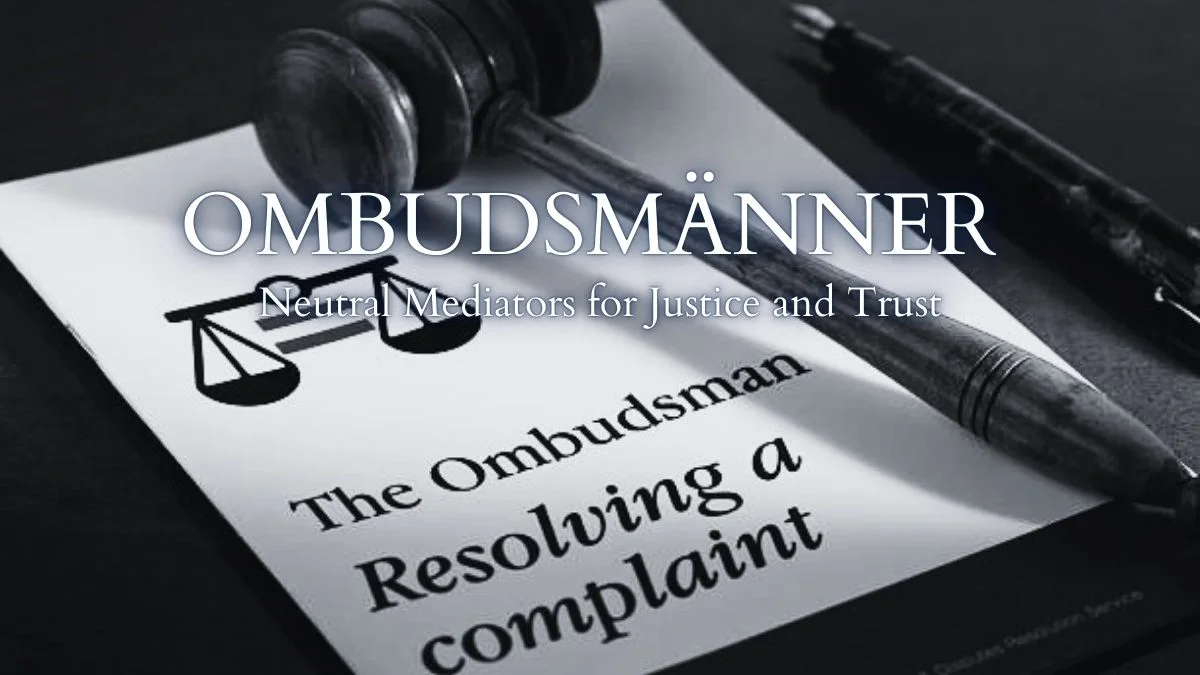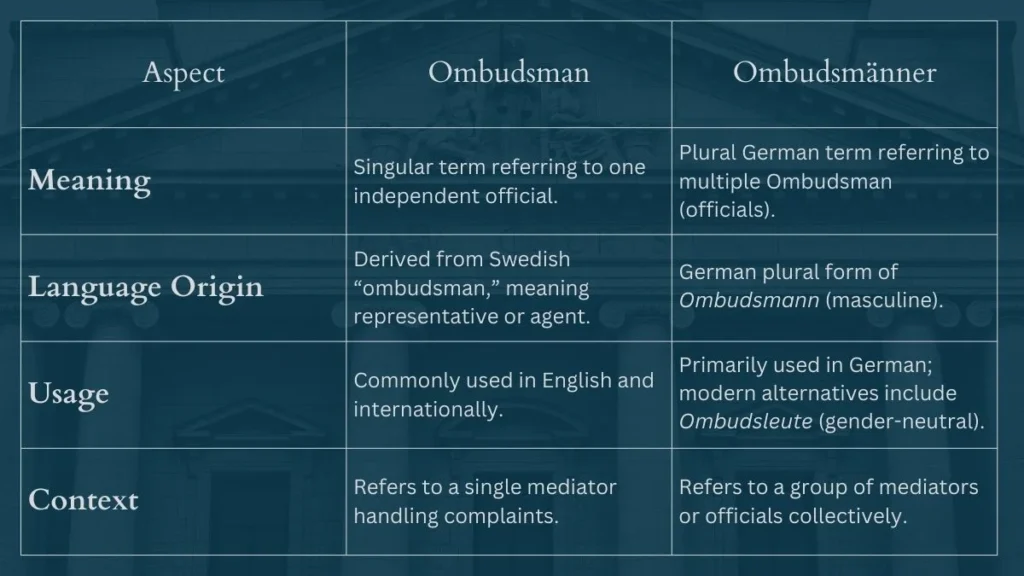Law
Ombudsmänner Explained: Meaning, Role & Importance

The word “Ombudsmänner” is derived from the singular Ombudsmann, which translates to ombudsman in English. The origin of the term is Swedish, where “ombudsman” means “representative” or “agent.” Over time, the concept was widely adopted in countries across Europe and beyond, including Germany.
- Ombudsmann (singular, masculine in German)
- Ombudsfrau (feminine equivalent)
- Ombudsmänner (plural, masculine form)
- Ombudsleute (plural, gender-neutral form)
While the German language reflects gendered forms, modern discussions often prefer inclusive terms such as Ombudsleute to emphasize equality and accessibility. Regardless of terminology, the core function remains unchanged: safeguarding fairness and addressing grievances impartially.
Table of Contents
“Ombudsmänner, the German plural of Ombudsmann, Ombudsmänner are independent officials in Germany who act as mediators between citizens and institutions, ensuring fairness, transparency, and accountability in resolving complaints.”
What Do Ombudsmänner Do?
The core responsibility of Ombudsmänner is to act as a neutral and independent mediator between individuals and institutions. Their duties can be summarized as follows:
- Complaint Resolution: Investigating concerns raised by citizens, employees, or consumers against organizations or government agencies.
- Ensuring Accountability: Reviewing whether institutions follow fair processes and comply with laws or ethical standards.
- Promoting Transparency: Making procedures clear, preventing secrecy, and ensuring decisions are made openly.
- Policy Recommendations: Suggesting reforms or improvements based on recurring complaints or systemic issues.
- Safeguarding Human Rights: Protecting individuals from unfair treatment, discrimination, or abuse of power.

Types of Ombudsmen
1. Government Ombudsman
These are public officials who oversee state agencies and ensure that administrative decisions are fair. For example, in many European countries, the parliamentary ombudsman acts as a watchdog over public administration.
2. Corporate Ombudsman
Within corporations, Ombudsmänner handle internal disputes such as workplace conflicts, employee grievances, or ethical concerns. They provide a confidential and safe channel for reporting issues without fear of retaliation.
3. Academic Ombudsman
Universities often appoint Ombudsmänner to help resolve disputes between students, faculty, and administration. Their role is vital in ensuring academic fairness, preventing harassment, and addressing misconduct.
4. Human Rights Ombudsman
In international organizations and NGOs, Ombudsmänner focus on safeguarding fundamental rights and addressing issues related to discrimination, equality, and social justice.
Real-Life Example of an Ombudsman in Action
In July 2023, Germany enacted the Whistleblower Protection Act, mandating internal reporting systems in medium and large organizations, ensuring anonymity, timely responses, and protection from retaliation. Breaches may trigger fines of up to €20,000. The German Ombudsman Association responded with detailed operational standards to guide the establishment and legal handling of ombuds systems
The Importance of the Ombudsman in Modern Society
In an era where institutions wield significant power, Ombudsmänner provide a balance between authority and accountability. Their importance lies in several key areas:
- Protecting Citizens: They ensure that individuals are not unfairly treated by bureaucracies or corporations.
- Conflict Prevention: By mediating disputes early, Ombudsmen prevent small issues from escalating into lawsuits or social unrest.
- Restoring Trust: Public trust in institutions grows when people know that there is an independent authority ensuring fairness.
- Promoting Ethical Conduct: In corporations, Ombudsmen help uphold integrity and encourage whistleblowing against unethical practices.
Challenges Faced by Ombudsman
Despite their critical role, Ombudsmänner face several challenges:
- Limited Authority: In many cases, they can recommend but not enforce decisions, making their influence dependent on institutional cooperation.
- Resource Constraints: Some offices struggle with insufficient funding or staffing, limiting their ability to handle large volumes of complaints.
- Public Awareness: Many citizens are unaware of their rights to approach Ombudsmänner, reducing the effectiveness of these institutions.
- Institutional Resistance: Organizations may be reluctant to accept criticism or change recommended by the Ombudsman.
Addressing these challenges requires stronger legal frameworks, public education, and institutional commitment to accountability.
Ombudsman vs. Ombudsmänner

Ombudsman and Human Rights Protection
One of the most critical roles of Ombudsmänner today is in protecting human rights. From investigating allegations of police misconduct to ensuring equal opportunities in workplaces, Ombudsmen serve as defenders of dignity and justice.
In countries with fragile democracies, they play an especially vital role in preventing abuse of power and advocating for marginalized groups. Their impartial position makes them a trusted mediator in sensitive situations where political or institutional interests could otherwise overshadow individual rights.
How to File a Complaint with the Ombudsman
Filing a complaint with an Ombudsman in Germany or elsewhere is designed to be simple, accessible, and free of charge. The process generally involves the following steps:
- Identify the Right Ombudsman: Choose the appropriate office depending on your issue (e.g., government, corporate, academic, or human rights Ombudsman).
- Prepare Your Complaint: Clearly describe the problem, include dates, involved parties, and attach any supporting documents.
- Submit the Complaint: Most Ombudsman offices allow submissions via online forms, email, postal mail, or in-person visits.
- Confidentiality and Anonymity: Complaints can often be submitted anonymously, ensuring protection for whistleblowers.
- Review and Investigation: Once filed, the Ombudsman investigates, seeks responses from the institution, and may recommend solutions.
FAQs
1. Are Ombudsmen legally binding in their decisions?
No, most Ombudsmänner provide recommendations rather than legally enforceable rulings.
2. How to contact an Ombudsman in Germany?
You can contact an Ombudsman in Germany through official government websites, dedicated hotlines, or by submitting complaints via online forms or mail.
3. Why is an Ombudsman important in a democracy?
An Ombudsman is vital in a democracy because they act as independent watchdogs, ensuring fairness, protecting citizens’ rights, and holding institutions accountable.
Conclusion
The concept of Ombudsmänner reflects society’s ongoing commitment to justice, fairness, and accountability. Originating from Sweden and embraced across Germany and beyond, these impartial officials serve as mediators between individuals and powerful institutions. Whether in government, corporations, or civil society, Ombudsmänner ensure that grievances are addressed transparently and equitably.
-

 GENERAL8 months ago
GENERAL8 months agoChristofle – For Those Who Dream of Family Heirloom Silver
-

 SPORTS10 months ago
SPORTS10 months agoDiscover the World of Football with Streameast: Watch Your Favorite Leagues and Tournaments
-

 GENERAL2 months ago
GENERAL2 months agoUncovering the World of кинокрадко: The Dark Side of Film Piracy
-

 GENERAL5 months ago
GENERAL5 months agoATFBooru: Anime, Gaming, and Subculture Imageboard























